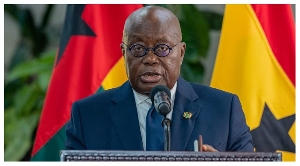- Home - News
- TWI News | TV
- Polls
- Year In Review
- News Archive
- Crime & Punishment
- Politics
- Regional
- Editorial
- Health
- Ghanaians Abroad
- Tabloid
- Africa
- Religion
- Election 2020
- Coronavirus
- News Videos | TV
- Photo Archives
- News Headlines
- Press Release
Business News of Tuesday, 28 April 2009
Source: GNA
Minister urges stakeholders to assist government on EPA decision
Accra, April 28, GNA - The Minister of Trade and Industry, Ms. Hanna Tetteh has urged stakeholders attending a forum on Ghana's Interim Economic Partnership Agreement (EPA) with the European Union (EU) to consider details of all aspects of the agreement to give a clear guidance.
Addressing the Forum on Monday, she called for "pragmatic conclusions on the way forward" to assist the government conclude a beneficial EPA for Ghana.
Ms. Tetteh said she was aware that in spite of work done so far, some challenges still remained particularly with regard to Ghana's role in the negotiation of the ECOWAS-wide EPA, the development aspect of the interim agreement, tariff revenue implications and concerns associated with safeguards and review mechanisms. "This forum should provide the opportunity to consider all these concerns in detail," she said. Ms Tetteh recalled that the African-Caribbean and Pacific (ACP) countries failed to conclude negotiations with the EU on a new trade agreement by the stipulated deadline, except for the Caribbean. Having reached this point, Ghana and some other ACP countries, in order to allay fears of the business community and investors regarding the future of trade with the EU, considered and accepted the offer to conclude a goods only agreement to ensure that trade was not disrupted between her and her major trading partners come January 1, 2008. Ms Tetteh noted that of the 15-member ECOWAS, 11 were Least Developed Countries by United Nations definition which allowed them to benefit from the "Everything but arms initiative" granting LDCs duty-free quota free access to the EU market for all their exports except arms.
Of the remaining four, Nigeria and Cape Verde are oil exporting countries whose economies are not heavily dependent on the trade provisions of the Cotonou Partnership Agreement (CPA). "Ghana and Cote d'Ivoire were therefore the only states to lose heavily if alternative preferential trade regimes were not put in place."
Ms Tetteh said while not going into details of estimated losses Ghana would gave incurred if an alternative arrangement had not been put in place, the cocoa sector, some processing industries and the horticultural sector would have been the worst affected in terms of export losses.
"It is for this reason that the subject of this workshop is so relevant as this situation has to be balanced against the adverse effects of trade liberalisation especially with regard to its impact on the rural agriculture and some particular farming and agricultural groups.
"This has implications for the livelihood of a great number of Ghanaians as well as the attendant revenue losses for government." The Minister said government insists that any free trade agreement Ghana signs must ensure among others ensure that market access offered does not impinge negatively on industry but ensures adequate protection for strategic sectors, whilst providing market opening opportunities for the exporting community. It should ensure that a tariff liberalisation scheme is designed such that it shall not derail our development aspirations and should also ensure that there are elements to provide a stimulation tool for an export-led trade regime and to increase investments into the domestic economy. 28 April 09










